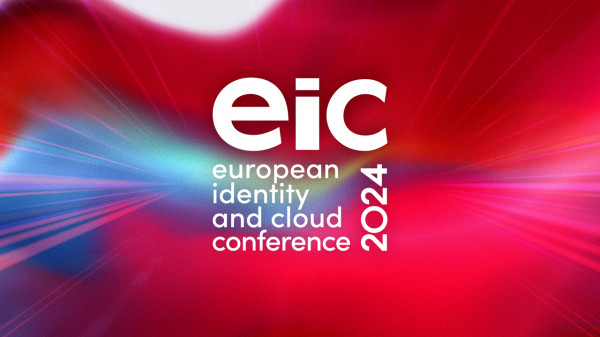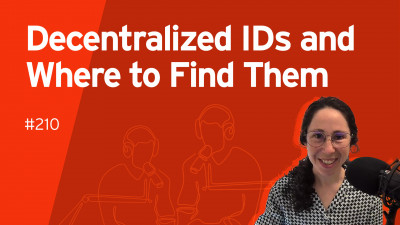Jackson Shaw, technology sector veteran and Chief Strategy Officer at Identity Access Management firm Clear Skye, is to deliver a keynote presentation entitled Identity and the Rise of Platforms at the European Identity and Cloud Conference 2021.
To give you a sneak preview of what to expect, we asked Jackson Shaw some questions about his planned presentation.
You say we are entering a new era of SaaS with new kinds of enterprise platforms, what do you mean by that?
What I'm trying to basically say is that what we've seen over the last 10 years is an explosion of SaaS applications that cover all kinds of different use cases. Every company out there is using many different SaaS applications, and in the identity space, that includes many things like governance, life cycle management, privilege account management, web access, [and] all kinds of different things.
But what I've been seeing over the last couple of years, is this whole dynamo of digital transformation. And we're seeing companies that are doing their digital transformation, but they're not doing digital transformation with identity as the centerpiece. They're doing digital transformation with some sort of a platform as the centerpiece. And it's through that platform that we see things growing like governance, life cycle management, provisioning, and many of the other core identity capabilities that are being built into these platforms.
So, my supposition or theory is that eventually we're going to see more and more of these capabilities in these platforms, which I believe is going to make for a very interesting marketplace where customers are going to be choosing between platform-based solutions that they're using for their digital transformation versus standalone identity solutions like they've used up until now.
Why do you think traditional IAM vendors are going to face competition from enterprise platforms like ServiceNow and Salesforce?
First of all, it's not just ServiceNow. You can see where this is starting to happen in other platforms like Atlassian, where they've started to add some of these capabilities. You see it even in Salesforce, you see it with the Okta acquisition of Auth0 and building more and more identity into theirs. And the stated future from Todd McKinnon, the CEO of Okta, is he wants to be a platform. So, it's nascent, and this is not something that's going to happen overnight, but you can definitely see where things, in the ServiceNow case where, for example, GRC is being added to ServiceNow, where security operations is being added to ServiceNow, where there's a lot of these capabilities that typically have been more identity focused and more separate.
So, I just think that you'll see over the next five to 10 years, where a lot more of the traditional capabilities that are in identity will start bleeding into these platforms, and then customers will be making a choice on what they want to use. And I think the biggest factor here is that for digital transformation, customers are picking these platforms as the centerpiece for their digital transformation. The identity piece is a supporting player, so to speak, but it's not the main course on the menu.
I think the problem that we're going to see - the tension between the platforms and the identity products - is that the money is going to be spent on the platforms. The strategic direction of a company is going to be on the platform, and the identity products that a company has, are going to have to fight to maintain their relevance within that sort of transformation as it occurs.
How could competition from enterprise platforms shape the future of the identity industry?
Well, I think what we've seen - again, if we look kind of a little bit historically - we've seen identity vendors start back in my day, doing email address synchronization, we've seen them do directory synchronization, [and] life cycle management. And then when we started seeing the identity vendors start acquiring other companies, when I was at Quest [Software], for example, we acquired 12 different companies to build our identity portfolio. So, you've seen all of these acquisitions occur with the intent of the identity vendor to build a suite of tools or in some ways, a platform, with the platform being built for digital transformation, whether it's ServiceNow or Atlassian or Microsoft Azure or any of the other products that are out there, or even Okta's intentions.
What we're going to see, is more and more of those capabilities become part of the platform, an easier and easier choice for a customer to say, I don't need to buy a specialized tool from a company that I don't really know and isn't part of my overall strategy. I'm going to go with my platform. And I think what we'll see is the pendulum shift from the identity players with a whole bunch of different products and different tools, back to where identity products are perhaps more niche-y. So, let's say five to 10 years, we're going to have a lot of specialized, very purpose-built identity products instead of these broad suites, and a lot of the general capabilities for identity that people are buying today, either as part of a suite or just general purpose, [will] now [be] inside the platform.
How is this trend going to affect traditional identity vendors – is it a question of adapt or die?
Well, again, I don't know if I'm lucky or unlucky, but I've seen this over the last 30 years basically. And I was thinking about this the other day, of all the organizations I knew before the SaaS revolution happened, that are no longer here. Like ISOCOR, World Talk, Critical Path and Softswitch. There's a whole bunch of these vendors that are no longer with us for various different reasons, but certainly SaaS being one of them, or the evolution of SaaS.
So, I think what we'll see is - and I'll take [for example] one of my previous companies who acquired a whole bunch of companies and they've built a platform or they've built a set of products that are on-prem, [and then] they've built a SaaS platform, and now they're trying to manage all of these things. I believe digital transformation is going to evolve these platforms to start eating into their lunch. I believe that there's going to be a number of vendors, especially the bigger vendors in this space today, that are going to suffer the consequences of not being ready for this movement towards the platform and the digital transformation that's occurring in companies.
Will everybody disappear? Well, of course not. There are a lot of companies that [date from] back in the nineties, that are still with us. But I think there, there's going to be another one of these tectonic shifts, or maybe it's not a tectonic shift, but certainly a change in the marketplace over the next five to 10 years.
What could or should CIOs and other decision-makers at end-user organizations do in response to the trend you describe?
The message I would want CIO's and the other people in the audience to take from this is that a number of these platforms are starting to provide significant value outside of a vendor like us, who have built on one of these platforms, but just in themselves. If we take ServiceNow as an example, it has a piece of software called Integration Hub. Integration Hub is 100% about integrating with other directories and systems. They connect to over 250 different systems. Why wouldn't a CIO want to use that because, well, in fact, they're already using it for things like Microsoft Teams and all kinds of other things internally. Why wouldn't they also want to use that for identity if the capability is there, which it is. So, what I want folks to take away from this presentation is that there is a rise happening with these platform vendors, and there will be a slow decline, in my view, of many of the identity vendors.
And if your digital transformation, your company's future, your customer experience, your employee experience, your partner experience is being focused on one of these platforms, you need to think about how identity can be a part of that digital transformation, instead of sitting to the side where it is now.
Do you think that these huge platforms will increase dependency of companies using these platforms to such an extent that this could limit the growth of those companies?
That's, that's an excellent question. [But] I almost want to flip it around, and say what's more appropriate for a company? Is it to be making a further bet - doubling down, to use a gambling term, on the platform that they're using, that they're betting their whole company on, versus an independent player, that might not be here tomorrow or the next day? When you look at the magnitude of the difference between, let's say the market cap of an Okta versus a ServiceNow or an Atlassian versus one of the other companies, we're talking about an order of magnitude. The same around Microsoft and their capabilities.
So, I think that there's more staying power, so to speak, more capability for those companies to continue to expand and buy into identity, than staying with a particular platform. You can just imagine it, for example, Okta, which just made a huge acquisition of Auth0 - Okta isn't immune itself from being acquired, right? It could be acquired by a Salesforce or a ServiceNow, or even a Microsoft. They have the capability and the depth. And that's my point. I think the platform players have more capability, depth, and long-term ability to do acquisitions and build more technology into their products.










































